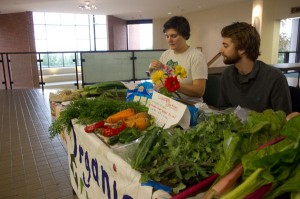Food seems to be a hot topic on campus these days. In recent weeks it has appeared in The Ithacan and Buzzsaw, and was the focus of Sodexo’s Better Tomorrow Plan Celebration. This is of little surprise, as it follows a wave of writers like Michael Pollan, Barbara Kingsolver and Jonathan Safran-Foyer, and documentary films like “King Corn,” “Supersize Me,” and “Food, Inc.,” which examine what we eat and the larger impacts of our grocery lists.

Remember the tomato from Wegmans that smiled to you from the display the other day? It could have been grown from genetically modified seeds to keep its color and firmness, covered in artificial nitrogen-based fertilizer that is synthesized from fossil fuels, sprayed with chemicals that kill insects and prevent them from trying to eat it and shipped across the country in a refrigerated truck. The costs of all of these processes includes a loss of biodiversity, eutrophication from fertilizer runoff and carbon emissions associated with the miles it has traveled — just to name a few.
As students at Ithaca College, we are at a unique junction where we have the option of embracing just about any food politics we want. Out from under the confines of our parents’ food habits, we are at a dietary Tabula Rasa, a blank slate where we can choose what types of consumers we wish to be: vegetarian, vegan, locavore, organic, raw food, paleo diet, or even the type that views D.P. Dough as a well-rounded meal for every night of the week. And unlike other movements that have gripped the campus consciousness — Occupy comes to mind — the food movement focuses on the daily choices we make, ones that have direct influence on our health and the world, and ones that can be changed by shifting purchasing habits.
Ithaca offers many ways to become involved with “good” food options. Venues like the farmers market, local food restaurants and cooperative grocery stores stock more sustainable and ethical food items. On campus, students with meal plans may be more restricted with their food options, but groups like Slowfood and Sodexo itself are working to improve the dining hall offerings. In addition, we have numerous campus groups that address issues in the areas of food justice, specifically Slowfood, IC Organic Growers Society and Food for Thought.

I have spent the semester working on a contribution to the “good” food movement on campus developing ICfresh, a local food service for students, faculty and staff. The initiative, which is set to launch this spring, will feature both community-supported agriculture shares and items for individual purchase. It will also allow students, especially those of us with limited transportation, to partake in the agricultural bounty that surrounds us. By removing the barrier to access and bringing local food right to the campus itself, we can make a campus-wide effort to support the economic, social and environmental benefits associated with local food.
People should look at their dietary choices not just as sustenance, but as a political and social statement that helps define the type of person they will be and the ideas they believe. With a subject matter with such profound consequences and such necessity to our lives, it is important that we choose foods that support the ideals of strong local communities, healthy natural products and sustainability. After all, you are what you eat.
Devin Castaldi-Micca is a junior environmental studies major. Email him at [email protected]







